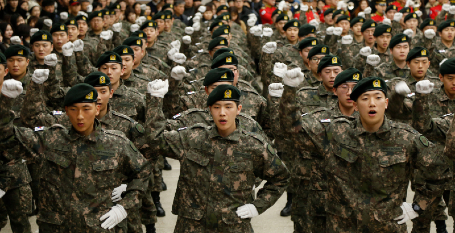A recent court decision on access the healthcare appears to be a setback.
A recent court case in South Korea has tested equality of access to the country's health benefits for LGBTQ people.
The case was brought by So Seong-wook against South Korea's National Health Insurance Service. The matter was heard by the Seoul Administrative Court.
The case centred on the decision by the National Health Insurance Service to withdraw spousal benefits from the employer of Seong-wook's partner. The argument made was that Seong-wook would have been entitled to the benefits if they were in an opposite-sex relationship, but it was discriminatory to deny the benefits on the basis that they were a same-sex couple.
The court dismissed Seong-wook's claim, which appears to have been a missed opportunity to bolster LGBTQ equality in South Korea. The court's judgment pointed to the legal definition of marriage in South Korea and stated that this would need to be changed in order for same-sex couples to be able to claim spousal benefits.
What’s life like for LGBTQ people in South Korea?
What’s life like for LGBTQ people in South Korea? Let’s take a look at some of the key equality indicators.
Is homosexuality legal in South Korea?
Yes. While same-sex encounters have never technically been illegal in South Korea, 2003 was a big step forward when homosexuality was officially declassified as “harmful and obscene”.
Are there anti-discrimination protections in place for LGBTQ people in South Korea?
While there are some protections in place at a local government level, national anti-discrimination legislation does not protect people from discrimination on the basis of sexuality or gender identity.
Is there marriage equality?
There is no legal recognition of same-sex relationships and no marriage equality.
What’s life like for LGBTQ people in South Korea?
South Korea is a socially conservative country. There remains a strong expectation that people conform to the norms of family and society. Homosexuality is seen as a taboo subject.
The impact of the Covid-19 has exposed some of the systemic homophobia that LGBTQ people have to navigate in South Korea.
South Korea has been using the trace-and-test method to try to contain Covid-19. One cluster of infections was been linked to Itaewon – the nightclub district in the capital Seoul. Fuelled by sensationalist media reporting, it led to a backlash against LGBTQ people and raised fears that testing for Covid-19 could lead to being forcibly outed.
Itaewon is where most of the gay clubs in Seoul are found. Media coverage of the cluster of cases linked to Itaewon included revealing the identity of men who had recorded positive tests for Covid-19 – names, ages, and workplaces. This was accompanied by increasingly homophobic rhetoric in the media, as people testing positive for Covid-19 had visited gay bars and saunas.
The rising tide of homophobia made it more likely for gay men to avoid being tested, for fear of the information being used against them.
“I admit it was a huge mistake to visit the gay district when the corona situation was not fully over…” Lee Youngwu, a gay man in his 30s, told the Guardian. “But visiting the area is the only time when I can be myself and hang out with others similar to me. During the week, I have to pretend to like women.”
“My credit card company told me that they passed on my payment information in the district to the authorities…” continued Lee Youngwu. “I feel so trapped and hunted down. If I get tested, my company will most likely find out I’m gay. I’ll lose my job and face a public humiliation. I feel as if my whole life is about to collapse. I have never felt suicidal before and never thought I would, but I am feeling suicidal now.”
What’s life like for LGBTQ people in South Korea?
What’s life like for LGBTQ people in South Korea? Let’s take a look at some of the key equality indicators.
Is homosexuality legal in South Korea?
Yes. While same-sex encounters have never technically been illegal in South Korea, 2003 was a big step forward when homosexuality was officially declassified as “harmful and obscene”.
Are there anti-discrimination protections in place for LGBTQ people in South Korea?
While there are some protections in place at a local government level, national anti-discrimination legislation does not protect people from discrimination on the basis of sexuality or gender identity.
Is there marriage equality?
There is no legal recognition of same-sex relationships and no marriage equality.
What’s life like for LGBTQ people in South Korea?
South Korea is a socially conservative country. There remains a strong expectation that people conform to the norms of family and society.
Homosexuality is seen as a taboo subject.












 列印版本
列印版本



















讀者回應
I say it is time to put the spotlight on these close-minded and brain-washing religious zealots.
請先登入再使用此功能。